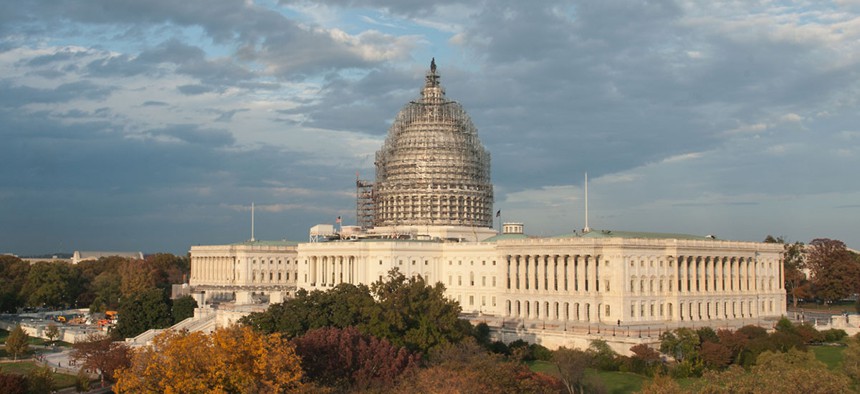
Architect of the Capitol
Congress's AUMF Debate in the Wake of the Paris Terrorist Attacks
The Paris attacks have brought new proposals, but legislators seem no closer to passing a resolution.
When Senator Lindsey Graham introduces a new authorization for the use of military force against the Islamic State, as he’s expected to do shortly, it’ll be a high-profile reminder to Republican voters that he’d like to be the most hawkish candidate in the 2016 primary field.
What it won’t be is a groundbreaking move to empower President Obama to take down the terrorist group, even after November’s attacks in Paris raised the stakes.
That’s not just because Graham’s AUMF will be more wide-ranging, and thus less palatable to Democrats, than the president’s plan. Rather, a combination of congressional inertia and lack of appetite from Hill leadership makes a united war resolution increasingly unlikely—and Congress remains no closer to reckoning with its constitutional obligations than it was months ago.
Congressional debate over Obama’s authority to combat the Islamic State flared, then quickly quieted after he introduced his AUMF in February. The two parties couldn’t agree on the scope of the president’s authority, and Obama didn’t want too much of it at all. As Paul Kane described it in The Washington Post, “the Obama administration has found itself caught in a position of sounding the alarm about potential terrorist attacks ... but offering a war resolution that includes limits on the scope of battle against the Islamic State.”
Republicans rejected those constraints, including a three-year time limit and restrictions on ground operations, with then-House Speaker John Boehner calling for “a comprehensive military strategy and a robust authorization, not one that limits our options.” War-weary Democrats, who want to temper the executive’s authority, had their own concerns: They worried that the AUMF’s limit on “enduring offensive ground combat operations” was far too vague, and could be used to justify a long, Iraq-or-Afghanistan-style military campaign.
At the time, congressional critics on both sides of the aisle were dismayed at the form the debate had taken. Democratic Representative Adam Schiff of California, for one, previewed the resolution’s death back in March: “I am increasingly concerned that Congress will take the path of least resistance and least responsibility and let the resolution die.” Senators Jeff Flake and Tim Kaine hoped, to no avail, to reset the conversation in June when they introduced a new AUMF.
Now, the Paris terror attacks have spurred some senators to call for renewed discussion about combatting the Islamic State. Kaine, Flake, and Senator Dianne Feinstein—who suggested that the U.S. look beyond its bombing campaign—have all publicly advocated for Congress to do more. And Graham announced in mid-November that he’ll be introducing his AUMF, which according to a recent Poststory has no temporal or geographic constraints, and doesn’t forbid the use of American boots on the ground.
But even if some are serious about a renewed discussion, it’s likely Congress would get bogged down by the same obstacles it’s faced before: not only because it’s divided over the particulars of the president’s authority, but because members don’t seem willing to act on their constitutional obligations.
Calling the Constitution “the biggest casualty in the struggle against the Islamic State,” Bruce Ackerman suggested in The Atlantic in August that the current standoff between the White House—which issued its AUMF request months into military operations against the Islamic State—and Congress dismantles “all serious restraints against open-ended war-making” by a president.
The constitutional question hasn’t escaped some senators. In early November, Senator Chris Murphy called holding debate around an AUMF Congress’s “responsibility.”
“I accept that the final product may be one that I oppose,” Murphy said, “but what is more offensive to me is that we’re not even trying to get a product.”
Similarly, in a post-Paris Time op-ed, Kaine and Flake took Congress to task for “abdicat[ing] its fundamental duty to debate, vote on and shape the extent of the current war on ISIS”:
A Congressional debate, at long last, about this war on ISIS will educate the American public about the stakes involved. It will force the administration to give thought to, and lay out a clear strategy that encompasses military and non-military dimensions—including diplomatic and humanitarian measures—for degrading and ultimately destroying ISIS, and for U.S. involvement with other nations in this struggle. It should let our troops, our allies and our adversaries know of our unity and resolve. Finally, it will vindicate the Constitutional role of Congress in making the sober decision about when military force is necessary.
For now, Congress seems more or less content with Obama using a 2001 resolution to justify anti-Islamic State military operations. Though the framers wanted Congress to decide when America goes to war, its members haven’t really tried to decide at all—not many months after military operations have already started and not after a terrorist attack.







